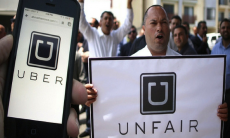
Uber has only contributed 2.56% of its overall profit intake to the UK economy, it needs to be regulated in such a way profits can be regularly accounted for as the money is generated from UK citizens. This hurts the economy as the budget would be much lower and with increasing number of internet companies being established, profits need to be regulated for fair playing field against competition. Measures such as increasing the percentage taxed on dividends being transferred into an account abroad can make the internet companies be taxed more fairer, this ensures all companies wanting to transfer a certain amount of money is taxed accordingly and also discourages the want to send money abroad as they will be then taxed again, respectively by that country of receipt. Additionally, legislating the need to open companies registered within the UK in order to collect profits could also be another potential solution, forcing them to oblige to contribute to the UK standards once the company begins to generate income from consumption of the product in that country.
Consequently, this ensures money isn’t sieved out the local economy which the Black Cab industry is angered by. This also encourages competition as Uber’s profits would be negated and therefore expansion is slowed to the point where it is fair against the local independent Taxi Cab services. Another outcome of this is more money in the budget allowing the government to improve infrastructure and roads accordingly - which is beneficial to all firms. This government action is also non-rival; in where ones use of the roads would not exclude benefit gained to other firms using the same good.
Uber has also been heavily criticised for its licensing and particularly loose background checks, that is required especially for private hire vehicles which are regulated by the TFL. As Uber operates as independent contractors where the drivers work their own shifts; they are not susceptible to the thorough TFL insurance checks. However, all vehicles need to be licensed with a commercial car insurance, a TCP and also Private hire insurance to make the vehicles road worthy. Additionally, Uber ensures all drivers are securely background checked via their addresses to cross reference any matching name and address to previous convictions. Previously, this check has been deemed as light but newer regulations enforces safer travels for everyone involved.
There have been incidents where Uber have failed to check their employees which led to further incidents in the journey or otherwise which have been tried at court. In February of 2016, Uber was heavily curtsied for its security and loose background checks compared to local Taxi Cab services as Jason Dalton who conducted a shooting spree whilst being able to work for Uber. This places consumers at risk as the driver is dangerous. Failure to pick up Dalton’s history was highlighted, proving that the current safety measures and background checks can be bypassed which raises concerns to public safety.
Measures which can be employed include ‘Live Scan’ a fingerprinting service which is used currently by most taxi companies to regulate new employees. The ‘Live Scan’ check can be used to help cross reference any convictions in state databases. This check is by far more thorough as it looks into deeper sources however employee sign up become longer. The average waiting time to become an employee for Uber is about 3 months however with these intended measures; waiting times could rise by 35% thus discouraging people to work for Uber. As a result, these measures may be overlooked and the firm argues databases may be out of date and some people have not been fingerprinted or charged with a crime.
Image Credits: pymnts.com

0 Comment:
Be the first one to comment on this article.